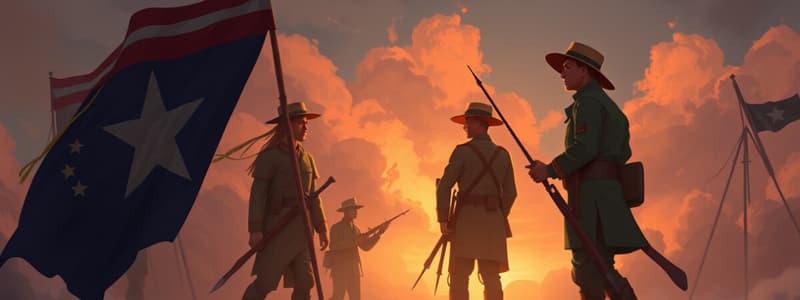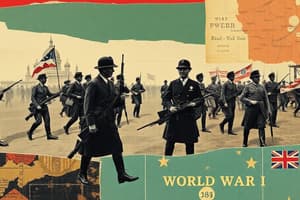Podcast
Questions and Answers
What are alliances?
What are alliances?
Agreements or promises to defend and help another country.
What is an armistice?
What is an armistice?
An agreement to stop fighting.
What is artillery?
What is artillery?
Cannons and large guns.
What does blockade mean?
What does blockade mean?
What is cavalry?
What is cavalry?
What is imperialism?
What is imperialism?
What was the Lusitania?
What was the Lusitania?
What was the Zimmerman Telegram?
What was the Zimmerman Telegram?
Who were the Allied Powers?
Who were the Allied Powers?
Who were the Big Four?
Who were the Big Four?
Flashcards are hidden until you start studying
Study Notes
Key Terms and Concepts
- Alliances: Treaties or commitments between countries to provide mutual support and defense.
- Armistice: A formal agreement made by warring parties to stop fighting, essentially a temporary cessation of hostilities.
- Artillery: Refers specifically to large-caliber guns, including cannons, used in warfare for long-range bombardment.
- Blockade: A military tactic that involves sealing off a region to obstruct the movement of goods and people in or out.
- Cavalry: Military units that consist of soldiers who are trained to fight on horseback, historically significant before the rise of mechanized warfare.
Historical Context
- Imperialism: The practice where a dominant nation exerts control over other nations, irrespective of size, leading to global power struggles.
- Lusitania: A British passenger liner that was torpedoed by a German U-boat on May 7, 1915. Its sinking resulted in the loss of 128 American lives, escalating anti-German sentiment in the U.S. and influencing its eventual entry into WWI.
- Zimmerman Telegram: A secret communication sent by Germany to Mexico proposing an alliance against the United States, which raised tensions and contributed to U.S. involvement in WWI.
Major Alliances in WWI
- Allied Powers: The coalition of nations opposing the Central Powers, including Britain, Belgium, France, Russia, Serbia, and, later on, the United States.
Significant Figures
- Big Four: The key leadership at the Paris Peace Conference post-WWI, consisting of:
- Woodrow Wilson: President of the United States, advocating for self-determination and the League of Nations.
- David Lloyd George: Prime Minister of the United Kingdom, focused on rebuilding post-war Britain and punitive measures against Germany.
- George Clemenceau: Prime Minister of France, prioritizing security and territorial restitution for France after German invasions.
- Vittorio Orlando: Prime Minister of Italy, seeking territorial gains for Italy and highlighting the significance of Italian contributions to the Allied cause.
Studying That Suits You
Use AI to generate personalized quizzes and flashcards to suit your learning preferences.




